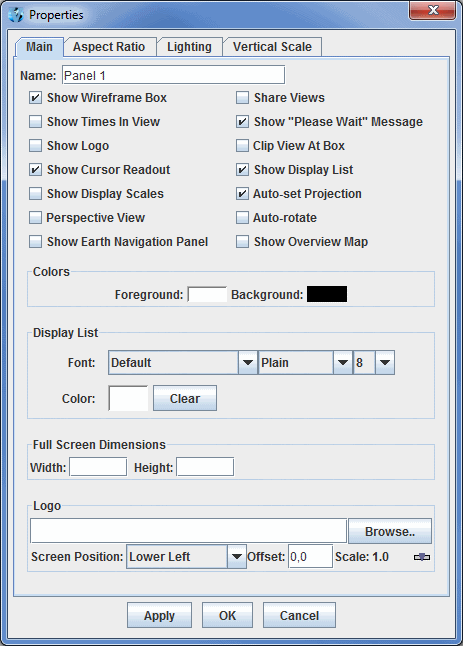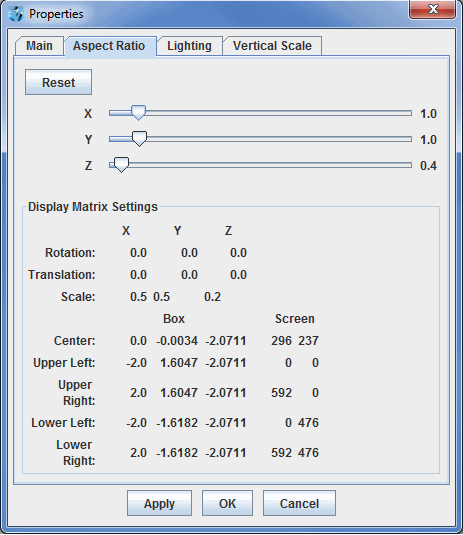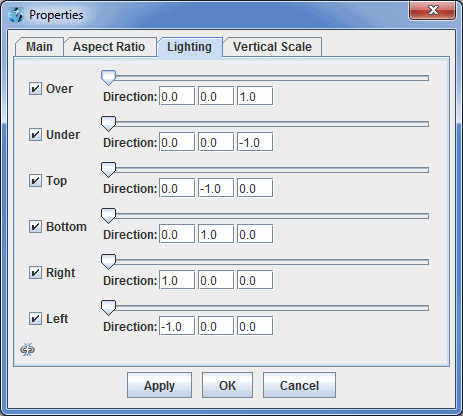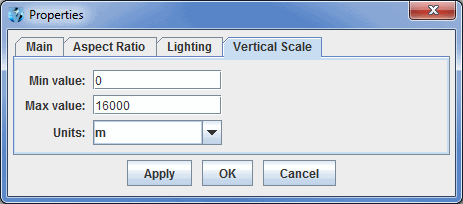Properties Dialog
Accessed through the View->Properties menu item in the Main Display window, this Properties dialog allows you to control many aesthetic aspects of the display. The Properties dialog window is composed of four tabs, Main, Aspect Ratio, Lighting, and Vertical Scale.
The Main tab of the Properties dialog allows you to change several general things pertaining to the display. Many of the items in this tab can also be found in the Display Window tab of the User Preferences window.
 Image 1: Main Tab of the Properties Dialog
Image 1: Main Tab of the Properties DialogProperties
- Name - Sets the name of the panel. This name will be centered between the Projections menu and the Time Animation Widget.
- Show Wireframe Box - Toggles the visibility of a 3D wireframe box around the data. This box helps provide orientation in 3D views.
- Show Times In View - Turns on the label shown inside the Main Display window that shows the current animation time and step in the loop.
- Show Logo - Adds a logo to the Main Display window. The logo is set at the bottom of this dialog.
- Show Cursor Readout - Displays a label of latitude, longitude, and altitude at the cursor position over the display, shown in the lower border of the Main Display window without having to probe the data.
- Show Display Scales - Shows a vertical scale in the map displays
- Perspective View - Provides an alternate 3D view of the display. This sets the 'set parallel/perspective projection' option in the Viewpoint Toolbar of the Main Display window.
- Show Earth Navigation Panel - Shows an Earth Navigation panel at the bottom of the Main Display window.
- Share Views - Controls whether sharing is turned on or off for the display. If sharing is turned on, then the viewpoint and projection changes are shared with any other displays that also have have sharing turned on.
- Show "Please Wait" Message - Displays a "Please Wait" message in the bottom toolbar of the Main Display window when McIDAS-V is in the middle of a process.
- Clip View At Box - Allows the user to omit from view all display elements outside of the wireframe box. This is helpful to remove map lines outside the area of data.
- Show Display List - Shows a listing of the names and times of the displays in the Main Display window.
- Auto-set Projection - Changes the projection to match the native projection of the newest data source added. When checked off, the current map projection will remain unchanged for any additional data source added to the display. This may be desirable when you have set up a view of a particular area and want to retain it when displaying new data.
- Auto-rotate - Turns on/off an automatic rotation of the display.
- Show Overview Map - Adds an overview map to the Legend, showing the area where you are viewing in the Main Display window.
- Colors - Changes the background and foreground colors of the display (not the map lines) to the selected colors.
- Display List - Controls how the list of the layers you are displaying at the bottom of the Main Display window will be written. You can modify the font, style, size, and color.
- Full Screen Dimensions -
- Width - Sets the width of the display when in full screen mode. Set this value to 0 or leave blank for the standard full screen display.
- Height - Sets the height of the display when in full screen mode. Set this value to 0 or leave it blank for the standard full screen display.
- Logo -
- Screen Position - Selects the location of the logo in the Main Display window. The options are Lower Left, Upper Left, Upper Right, Lower Right, and Center.
- Offset - Adds an offset of the logo from the screen position selected. This is in the format of (x,y).
- Scale - Scales the size of the logo in the Main Display window. Use the slider to change this value. A value of 1.0 uses the full size for the image, values below 1.0 make the image smaller, and values greater than 1.0 make the image larger.
The Aspect Ratio tab of the Properties dialog allows you to change the aspect ratio of the display with respect to the X, Y, and Z directions. You can change the individual X, Y, and Z values by using the slider. Any changes will be made to the display once you hit Apply or OK. The Display Matrix Settings panel will actively update as you change the X, Y, and Z values, and as you rotate or zoom in/out of the Main Display window.
 Image 2: Aspect Ratio Tab of the Properties Dialog
Image 2: Aspect Ratio Tab of the Properties DialogProperties
 - Resets the X, Y, and Z values back to the last values applied to the image. If you have not yet hit Apply, then the values will return to default.
- Resets the X, Y, and Z values back to the last values applied to the image. If you have not yet hit Apply, then the values will return to default.- X - Stretches the display along the X-axis. The higher the value, the more stretched in the east-west direction the display will be. The default value for this is 1.0.
- Y- Stretches the display along the Y-axis. The higher the value, the more stretched in the north-south direction the display will be. The default value for this is 1.0.
- Z - Stretches the display along the Z-axis. The higher the value, the more stretched in the vertical the display will be. The default value for this is 0.4.
- Display Matrix Settings - Displays information pertaining to the rotation, translation, and scale of the X, Y, and Z axes. This also displays numerical values pertaining to boundaries of the Main Display window and also the wireframe box. These values actively change as you apply changes to the X, Y, and Z sliders, and as you rotate or zoom in/out of the Main Display window.
The Lighting tab of the Properties dialog allows you to add the effect of light shining on your display from different angles along the X, Y, and Z axes. The default values are listed in the image below.
 Image 3: Lighting Tab of the Properties Dialog
Image 3: Lighting Tab of the Properties DialogProperties
- Left Column - Denotes the direction that the light will be shining from. You can uncheck the checkboxes in order to not add lighting for specific directions.
- Slider - Controls the intensity of the light. When the slider is on the far left, there is no light, and the brightness increases as you move the slider to the right.
- Direction - Represents the direction that the light will be coming from. The first box is from the X direction, with positive values aiming the light right along the X-axis. The second box is from the Y direction, with positive values aiming up along the Y-axis. The third box is from the Z direction, with positive values aiming up along the Z-axis.
 - When this is button is seen, all of the components in this tab are controlled individually. This means that a change to one item (ex. Over), will not effect any of the other items in this tab. When you click this button, the image will change to
- When this is button is seen, all of the components in this tab are controlled individually. This means that a change to one item (ex. Over), will not effect any of the other items in this tab. When you click this button, the image will change to  . When this image is seen, the components are linked together. Therefore, any change to the visibility checkboxes or the slider for brightness will be shared between all components of this tab.
. When this image is seen, the components are linked together. Therefore, any change to the visibility checkboxes or the slider for brightness will be shared between all components of this tab.
The Vertical Scale tab of the Properties dialog allows you to change the vertical scale used for the Z-axis of the display in the Main Display window.
 Image 4: Vertical Scale Tab of the Properties Dialog
Image 4: Vertical Scale Tab of the Properties DialogProperties
- Min value - Sets the minimum vertical value to use for the Z-axis in the Main Display window. The default value for this is 0.
- Max value - Sets the maximum vertical value to use for the Z-axis in the Main Display window. The default value for this is 16,000.
- Units - Sets the units used for the vertical scale in the Main Display window. The default value for this is 'm'.




